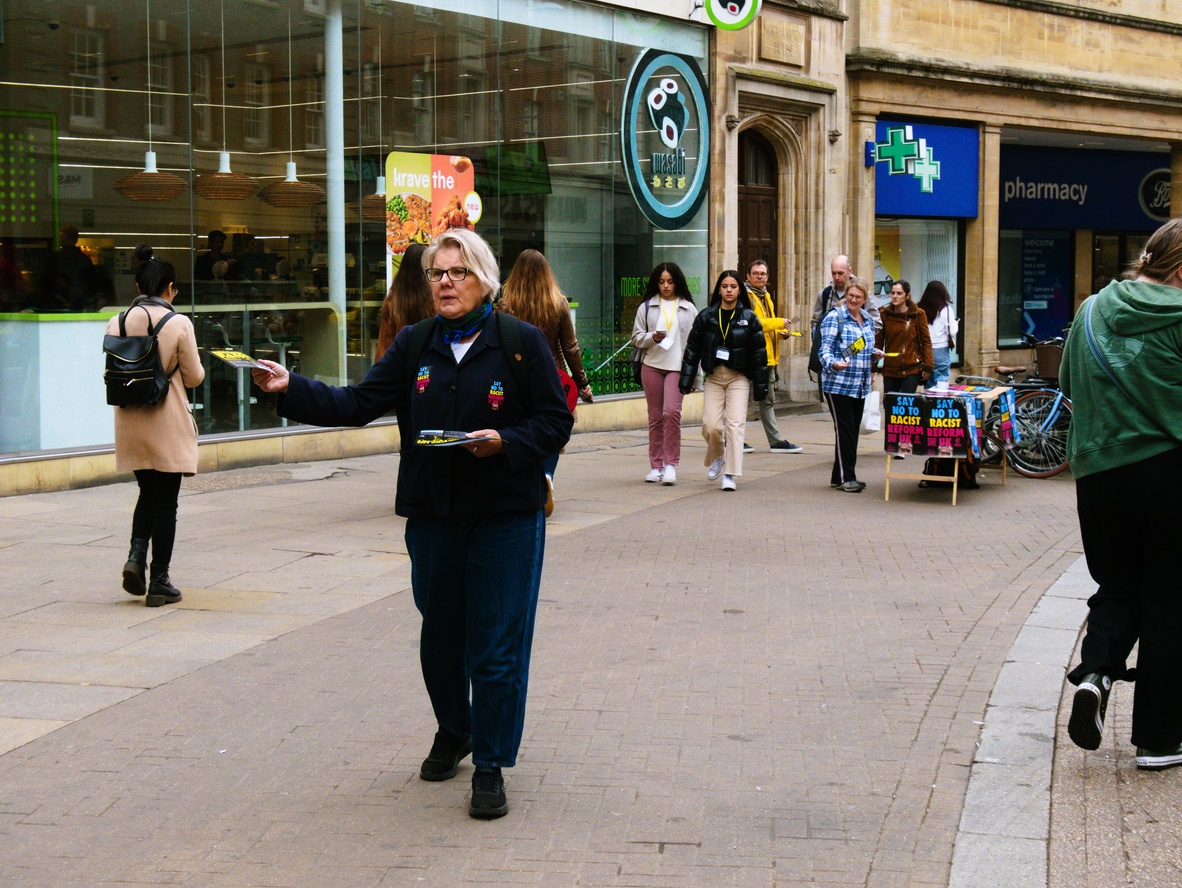Revisited: Is All Volunteering Created Equal?

In this latest Points of View, we look back to an early Points of View column from Engage founders Steve McCurley and the late Susan J. Ellis. Published in July 2003, the article posed this question: Is All Volunteering Created Equal?
We strongly encourage you to read Susan and Steve’s thoughts before continuing here.
No, seriously. Go and read them.
Thank you.
When we started preparing our reflections on this 2003 article, our first question was naturally this: Is it still a valid question, or have we moved on? The answer, in our view, is that this is absolutely still a valid question. In fact, we even see it reflected in different ways than those Susan and Steve covered.
Political considerations
Don’t worry, we’re not straying into the divisiveness of party politics here. But volunteering is a political act. It’s an individual making a choice about what matters to them and what they want to do about it.
To pick up on a theme from Susan and Steve’s article, there is a question posed about who defines what a (to use their term) “serious social problem” is. The point being that if I choose to support one cause, and you support another — let’s say human services and animal care — is one more important than the other? Who defines that importance and does it matter?
In one sense, no, it doesn’t matter. We live in a world with a multitude of problems and eight billion people. There is plenty of volunteering potential to go round to work on those issues. In addition, if we consider part of the value of volunteering that someone is actively engaging with their community and the world, then any volunteering has value.
A more valid question, as was discussed in 2003, is whether the volunteer time is directed to addressing the causes of the problems we face, or to addressing the symptoms. Again, there is room for both, and Rob wrote about this earlier this year on LinkedIn so you might want to check that out here.
All of which reminds us of the proposals that occasionally appear, often from governments or think tanks, that people who volunteer should be able to speed up their citizenship applications in settled countries, or receive tax discounts for giving their time. These ideas are well intentioned but tend to fall at a practical hurdle — what gets counted as valid volunteering to entitle the individual to these benefits?
The very real danger becomes that the initiators of such schemes get to dictate the types of volunteering that are considered legitimate. Left to the hands of, for example, national governments, this can become a dangerous thing. Some volunteering becomes more valid than others. For instance, giving time to a hospital would likely be valid, protesting against public policy less so.
As Susan, said in 2003:
”Do you think any politician who espouses volunteering as good civic engagement means lobbying or agitating? They mean ‘helping out.’”
Seen through such a political frame, legitimate forms of volunteering can suddenly become problematic to some.
The UK has long history of volunteers saving lives at sea thanks to the Royal National Lifeboat Institution (RNLI). They turn out, in all weathers, to save people in difficulty on the coast of the country. Who could have a problem with that? Well, in the context of a debate on immigration and small boats crossing the English Channel, some have accused the RNLI of becoming a migrant taxi service.
It strikes us as dangerous for volunteering and for society if we start to place value judgements on whether all volunteering is created equal in the context of small or big ‘P’ political debates.
Wage replacement
Another aspect that has changed since Susan and Steve’s 2003 article is the embedding of wage replacements as a common measure of valuing volunteering across the sector.
When we apply a generic hourly wage replacement value to all volunteering, it reinforces the ideal that all volunteering is the same and that no volunteering is more valuable than others. This is problematic in the same way when we apply equality instead of equity – treating everyone the same, regardless of whether that is what they need, or reflective of the relationship and impact they’re having on our mission.
The hourly wage replacement is also not reflective of actual daily practices in Volunteer Engagement. For example, does it make sense to you to count at the same ‘wage’ an hour of a Board member making budgetary or policy decisions for an organization as someone handing out water bottles at a charity race? Would we pay the same hourly wage for someone with significant expertise in a subject as someone in training?
According to wage replacement valuing we do.
Here’s a simple question to ask yourself on this: Do Board members or other volunteers in roles of authority and significant responsibility receive the same benefits, recognition and resourcing as more transactional, episodic volunteers? If not, then whether you use the wage replacement or not, you’re not actually valuing all volunteering the same.
DEI and informal volunteering
The chances are that any time you look at survey data on volunteering rates you’re only getting part of the story. Most research, especially at national level, focused primarily on formal volunteering, time given through an organisation. Informal volunteering (random acts of kindness, helping a neighbour, looking after someone’s cat whilst they go on vacation etc.) goes largely unreported and undervalued. No surprise perhaps when many people would never consider something like helping a senior cross the road as an act of volunteering.
We say all this because the framing of most debates and discussions on volunteering is through the lens of just one type of volunteering, formal volunteering. That means a huge amount of volunteering gets forgotten about. In that regard, not all volunteering is created equal — formal volunteering is implicitly more visible and thus valid than informal volunteering, regardless of what the activity achieves.
One consequence of this is that we are often blind to what goes on informally. We miss a richness and diversity of volunteering in our communities and nations, often with practical implications.
For example, Volunteer Engagement professionals often talk about groups of people who are under-represented in volunteering. What this actually means is that these groups aren’t doing what the mainstream considers to be valid volunteering, i.e., formal volunteering.
Such a mindset keeps us blind to all the ways these groups may be active in volunteering that flies under the radar of our definitions of volunteering e.g. advocacy, self-help, campaigning. It also ignores that for many on our planet, their language and culture has no equivalent to the western concept of volunteering. Why have a separate word for something that is a fundamental part of how a community lives together?
When we say groups are under-represented in volunteering, what we’re actually saying is they don’t engage in ways we consider valid. We have, in-fact, historically marginalised and excluded them.
A solution is to embrace a broader conception of volunteering, to make the informal as valid as the formal. In doing so we open up a world of possibility for who can help our missions and how they can do it, rooted in our communities, and not imposed through an abstract framework of formal volunteering that works for some but limits potential for all.
Is all volunteering equally good?
In their 2003 conclusion, Susan wrote that “all volunteering is good. Any volunteer role has the potential to matter greatly.” And Steve concurred, with a caveat: “All volunteering is good. Some volunteering is better than others.”
We found it interesting that both assert that all volunteering is good.
We’re not so sure that’s something we’d agree with in 2025.
- Is volunteering good when volunteers do menial tasks that have no meaningful connection to the broader goals and mission of the organisation? It is good to allow such tasks to be assigned to volunteers simply because the paid staff don’t want to do them or an organisation chooses not to pay someone to do them?
- Is volunteering good if someone is being forced to do it? What level of coercion causes it to be ‘bad’? Is a high school graduation requirement acceptable, but community service in lieu of a prison sentence bad? Why?
- Is volunteering good if it places demands on someone such that the impact on the volunteer’s health and wellbeing is negative, perhaps due to stress or overwork?
- Is volunteering good if it is done only for nonprofits? What about volunteering for public services? Or perhaps more controversially, in a private sector organisation? As a colleague of Rob’s used to remark, why are seniors allowed to benefit from volunteers in voluntary and public sector care homes, but not private sector care homes? Is that fair?
- Is volunteering good regardless of who does the volunteering and what values they and their volunteering espouses? See this excellent article from our Engage colleague Breauna Dorelus for a fantastic example.
- Is volunteering good as long as the volunteer is fulfilled after the experience? Or do the needs of an organization or individual have to be met by the volunteer’s efforts to conclude the volunteering is good? Who gets to decide?
- What gives an act of volunteering its value, and for whom – the volunteer, the beneficiary, the organisation? And on which basis do we decide if different approaches to volunteering are ‘better’ than others?
Conclusion
As we asked at the start, “Is all volunteering created equal?" Some 22 years after two writers first asked that question in this journal, we absolutely believe that this is still a valid question.
In 2003, Susan and Steve mainly approached the question through the lens of whether volunteering was equal in light of the importance of the cause being supported. Here, we’ve broadened that out to intentionally give a wider perspective and help us all reflect on the question in a more contemporary and ethical context. We recognise that along the way we’ve probably asked more questions that need thoughtful consideration. That’s intentional. And we’d love to get your thoughts and reflections in the comments below.
Over to you.


